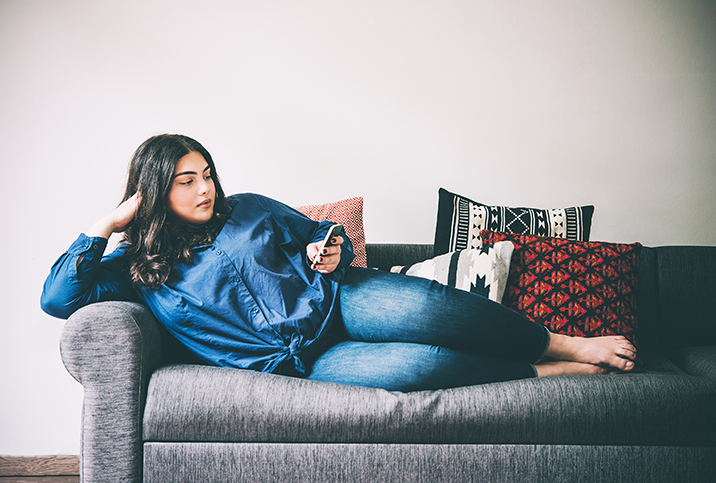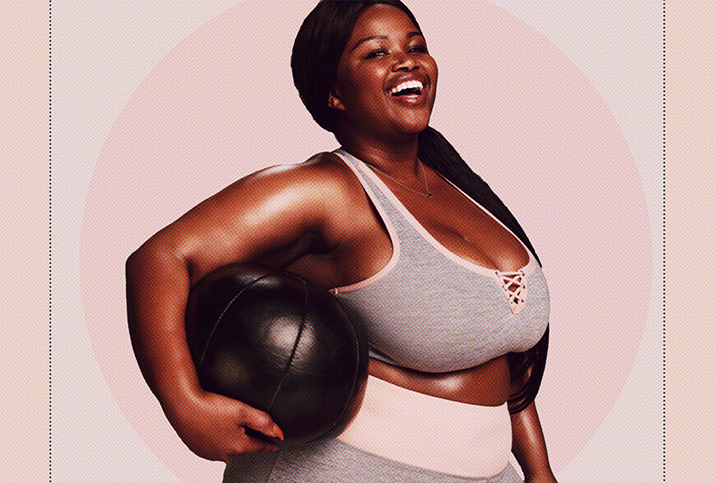Tips for Living and Dating With Obesity—and Improving It

Obesity occurs when your body fat level is too high, but it is a complex disease that goes far beyond aesthetic factors. Being extremely overweight is linked to a shorter life span and a poorer quality of life that comes with physical restrictions, body pain and exhaustion.
Being obese can affect far more than just your ability to run a marathon or fit into small clothes. The effects of living with obesity can impact many facets of your life, including your sexual health. It's a medical issue that raises a person's risk of major diseases such as cancer, diabetes, heart disease and hypertension.
Learning more about obesity's impact on daily life and dating life, as well as how to get help for treating and preventing the disease, can be important to a person's overall well-being.
Living with obesity
Living in an obese body can make it more difficult and uncomfortable to perform all types of activities of daily living. These include completing housework such as laundry and vacuuming, mowing the lawn, running errands, shopping and even walking around your place of work.
Most notably, obesity can limit your functional capacity to exercise or participate in sports, which can then further limit energy expenditure and compromise weight-loss efforts.
Then there are the mental health impacts of living with obesity that are largely due to the negative stigma that surrounds the condition.
"Weight bias is also extremely common, which can make patients struggling with obesity feel isolated. Weight biases are negative attitudes held by others towards people with obesity due to a lack of understanding of the disease," said Michael L. Glickman, M.D., the founder of Revolution Medicine, Health & Fitness, a Washington, D.C., practice that specializes in a holistic approach to weight management. "For those with obesity, it can impact mental health, cause discrimination in employment and negatively affect wages. Patients with obesity even experience weight bias from healthcare professionals."
For many people with obesity, their condition is a daily physical and mental struggle, according to Kimberly Gomer, M.S., a registered dietitian, licensed dietitian nutritionist and the director of nutrition at Body Beautiful Miami.
"Feeling overwhelmed with a big problem and having failed, sometimes over and over without a result, makes the problem a huge challenge," she said.
Ultimately, for many people, what this can mean from a practical standpoint is that a vicious cycle ensues in which trying unsuccessfully to lose weight causes emotional pain or a sense of hopelessness. This then spurs emotional eating, which can further exacerbate weight gain and a feeling of being powerless and stuck in a larger-than-desired body forever.
Dating with obesity
No universal standard exists for what everyone finds physically attractive in a partner. Just because someone has a larger body does not mean they have trouble finding people who are sexually attracted to them. That's despite the perpetuation of certain beauty ideals, though such ideals can create challenges, biases and stigmas that people struggling with obesity face on the dating scene.
"Those who don't have a scientific understanding of obesity can have negative attitudes or judgments about those struggling with obesity, such as having poor willpower or laziness," Glickman said. "Increasing the awareness about the latest science in obesity can help with the compassion that those with obesity have for themselves, as well as compassion they experience from others."
Projecting self-confidence can be difficult for many people when they don't feel positive about how they look and feel, Gomer said.
"Our culture judges us on how we look, but what we project is even more powerful," she added. "Many people's self-esteem is wrapped around their weight, and figuring a way out of it changes everything for them."
In other words, people who live in an obese body can be sexually and romantically desirable to a partner. It doesn't matter if you are interested in making strides toward changing your weight; loving yourself and feeling confident in your skin is always an attractive quality.
Tips for improving obesity
Glickman said many of the issues surrounding obesity could be improved if individuals, media and society at large took steps to:
- Disseminate the correct information about the multifactorial issues that surround the development of obesity.
- Put an end to the misinformation about obesity that comes from many sources, including TV, magazines, newspapers and the internet.
"Not all advice is bad, but at the same time, what works for one person may not work for another," he said. "We also need to be aware of deceptive food labels in the grocery store, which can make being an educated consumer challenging."
In terms of obesity prevention and treatment, Glickman said the first step to combat misinformation is to see a doctor who specializes in obesity. The American Board of Obesity Medicine (ABOM) website has a search tool to find a list of doctors in your area who are board certified in obesity medicine.
"Treating obesity requires a comprehensive team of trained healthcare professionals, as obesity is a complex disease," he added.
Gomer also shared the following tips for preventing and improving obesity:
"Look at lifestyle, not dieting. Know this is a marathon, a journey, not a sprint. Weight struggles are multilayered. There is not one approach or eating plan, exercise…that works for everyone," she said. "Finding that combination of seeking support and taking this on yourself—with love—is key."
Take a multipronged approach and seek personal and professional support so you don't have to go it alone, and make practical changes.
"The best thing a person can do who is obese is to stop eating processed foods, remove apps for food delivery from their phone and start making easy meals at home with 'real' foods," Gomer advised. "Get help with all facets of lifestyle: exercise, sleep, stress and, of course, a food plan."
When to seek help for obesity and who to see
If you are struggling with obesity or excess weight, start with an appointment with your primary healthcare provider. Your physician can assess your risk factors, make a diagnosis and refer you for further testing and treatment.
Working with a registered dietitian, nutritionist, personal trainer and/or mental health professional can also be beneficial, depending on the causes of your particular situation and your needs.
If you don't have a regular physician, now is the time to find one. Giddy telehealth takes the difficulty out of such a search, providing access to hundreds of healthcare professionals who offer video visits as a regular part of their practices. It is an easy-to-use online portal whose physicians, therapists and others have expertise across the full scope of medical care. Many have same-day appointments.
OTC obesity care
Unfortunately, the weight-loss market is saturated by gadgets, gizmos and supplements that claim to provide quick solutions. However, many of these products are either ineffective or unsafe.
Some vitamins and supplements may be helpful, but there is no magic pill.
"A person can definitely consider supportive supplements, [but] those are recommended based on labs and symptoms," Gomer said.
How to support someone who is trying to lose weight
Almost all of us know someone who struggles with obesity, and we can help support them on their journey to lose weight if they are indeed interested in social support.
Gomer says compassion is essential.
"Never, ever judge that person. For some, sugar is a stronger drive than cocaine. Addiction with food is real, and it's so hard to change our cultural ways of using that drug," she noted. "If someone you love needs to lose weight, offer support, not criticism. Offer to walk with them to show your support."


















